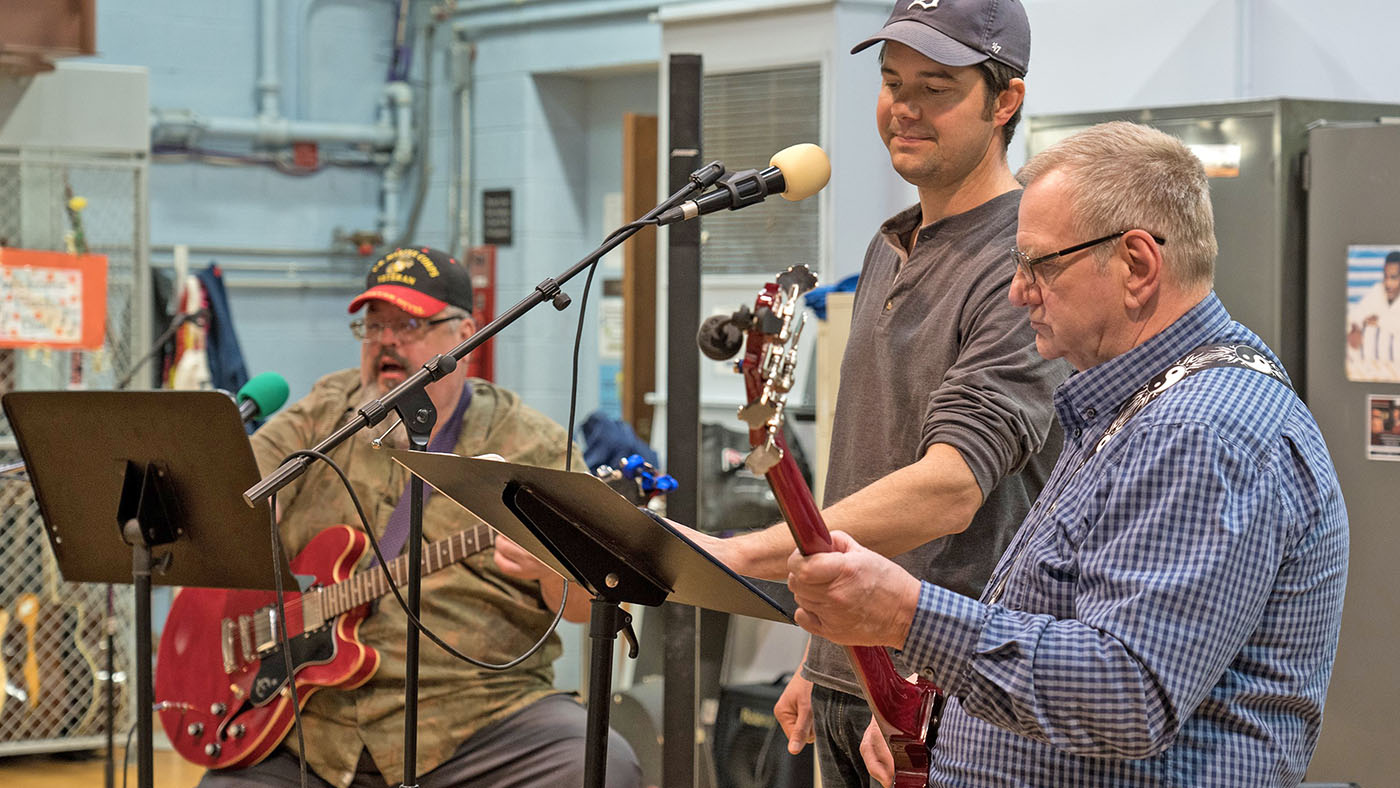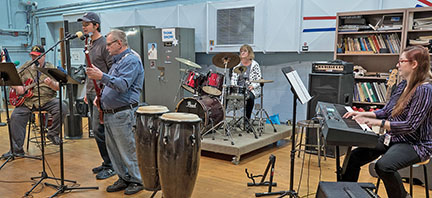Creative art therapists and Veterans at Battle Creek VA are using their musical skills to help Veterans navigate mental and physical challenges. This unique program also offers a path for Veterans to connect with others even when it is non-verbal.
Creative arts therapies are part of VA’s Recreation Therapy Service and are direct care programs that include art, dance/movement, drama and music. Battle Creek VA has worked with nearly 500 Veterans in outpatient, inpatient mental health and residential programs throughout 2023.
“Music therapists go through specific training in order to know when to intervene, when and what songs to play or what non-verbal cues to look for in this type of therapy,” said Taylor Fox, recreational arts therapist. “I think what sets us apart is the clinical application of music to address challenges.”
Music therapy’s 70-year history in the military covers the entire continuum of care among service members, Veterans and their families. It is a vital part of treatment currently delivered in military treatment facilities and VA medical centers across the country by board-certified music therapists.
“I jumped at the chance and it’s been awesome.”
For Marine Corps Veteran Daniel Dunn, it continues to be part of his lifestyle and it allows him to cope with depression following an accident in 2001. “I came to the medical center to see a mental health specialist, and she mentioned the music therapy program and I love and played music before, so I jumped at the chance and it’s been awesome. Music therapy helps me with getting the angst out and, without it, I probably would not be in a good place,” Dunn shared.
According to the American Music Therapy Association, music therapy has been in practice since the early 19th century. In 2005, VA doubled the number of music therapists at its clinics across the country to better treat Veterans.
Music therapy is not exclusive to Veterans as individuals, but it brings opportunities for Veterans to practice and perform as a group. At various times throughout any given week at Battle Creek VA, the stage of the medical center auditorium has Veterans playing different instruments together and connecting as a group.
“When we’re up here, we’re working as a team like when we were in the military. There’s this cohesiveness and camaraderie when we’re on stage. You don’t have to be isolated and if you’re not talkative, you can still be a part of something when you’re playing music with others,” said Dunn.
For some Veterans, music has served as a lifeline to find new ways of expression and ultimately a way to improve on a personal level.
“He was becoming more in touch with what he was feeling.”
“We had one Veteran come in who was in our residential program and we could see he was struggling to express himself and not always comfortable finding the words for what he was feeling,” said Fox. “You could see him though on stage and put it all out there, and his confidence blossomed throughout his time here. He completely became a different person. He was making connections with other Veterans during our jam sessions, and he was becoming more in touch with what he was feeling and able to express that a little better.”
Fox also uses music therapy at the medical center’s community living center, where not all Veterans have the communication capabilities they once had. About 50 Veteran residents there may be suffering from dementia, terminal illnesses or have become non-verbal.
“One aspect of music therapy I find important is the connection people feel whether between Veteran to Veteran, myself and a Veteran or between caretakers and Veterans. My hope for Veterans who enter music therapy is that they discover or rediscover a coping tool they can utilize throughout their recovery. I also hope they find a community and connection with others to better understand that they’re not alone,” Fox said.
Topics in this story
Link Disclaimer
This page includes links to other websites outside our control and jurisdiction. VA is not responsible for the privacy practices or the content of non-VA Web sites. We encourage you to review the privacy policy or terms and conditions of those sites to fully understand what information is collected and how it is used.
More Stories
Study underscores important role COVID vaccination can have in protecting Veterans from infection and reducing long-term health consequences
Columbia VA’s robotic surgery teams completed their 800th robotic surgery and are on schedule to hit 1,000 by the end of the year.
In a decentralized clinical trial, Veterans can participate from their own homes or local VA instead of having to travel to a research site.








I am interested in the music therapy as well as the story writing therapy. How do I get started in the programs?
Jazz, Jazz, Jazz; and all that Jazz is a welcome respite from my overall aches and pains and Tinnitus
malady as well. When I am home , there is always something great to listen to; right now I am listening
to trumpeter Clark Terry Vol. Two. Nice and mellow, and is great background music as well. Enjoy and
try to relax.